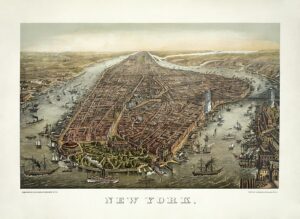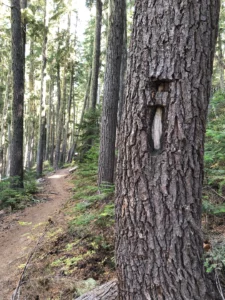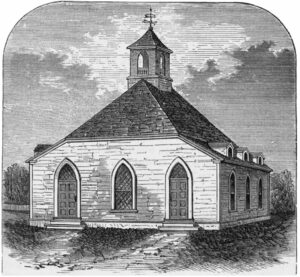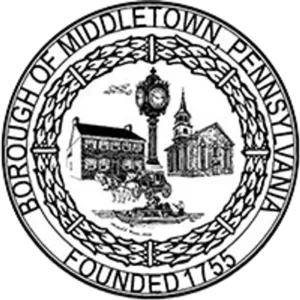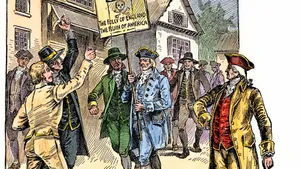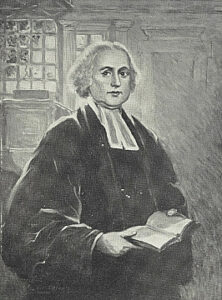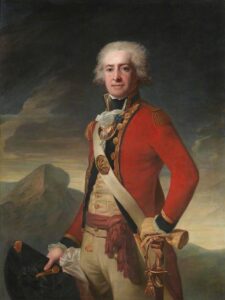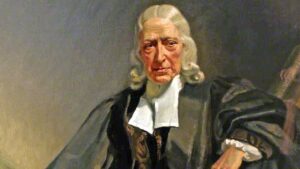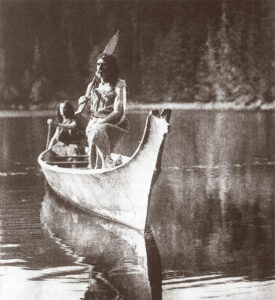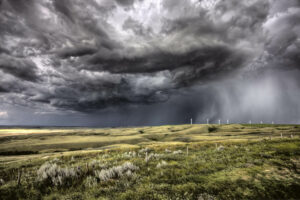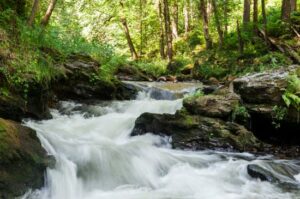Americanism Redux
August 8, your today, on the journey to the American Founding, 250 years ago, in 1774
I’m in this place I can’t quite figure out. There’s a way out, somehow. There’s a way ahead, somewhere?
How do I not go down?
https://youtu.be/j6-9p9O-nYw?si=BJirlwajWXKajeNU
* * * * * * *
The last thing he remembers is the horse and the air and the blackening. And today, 250 years ago, and roughly a week after these last remembered things, 12-year old Calvin Piper hears himself speak a few words to a pastor who is praying by his bedside.
His head landed on a large rock after he was thrown from a horse. Next everything was black.
They carried him into a house. The hours and then the days. They cut into his arm and bled him on the promise he would feel better. Black. He lapses into sounds no one understands. He cries and vomits. Black.
Someone picks up a device. It is used to bore holes through a hard surface. Someone says it will help Calvin by showing his brain through the hole. Trepanning is the term. Black.
Another someone places the device on the table. Picks up a knife. They hold Calvin down. Black. A slice around the head and hair. An explosion of anti-black, so bright it blinds. The skull, not the brain, revealed. A thickened blood massed across the orbed bone. The slice laid back over, where it was, for healing.
The pastor, with the parents, by the bedside of the whispering boy.
I want to know where I am in the gray that covers my eyes.
* * * * * * *
(the strange world)
In New York City, for the first time, in America, for the first time, in somewhere other than the Old World, for the first time. Ann Lee is on Manhattan Island, looking for work, staring at the sights around her.
Today, 250 years ago, she is two days off the ship that brought her and the other “Shakers” from England. She has come here to worship as she believes. She had no idea of the world she was entering where not only people talk fast but they talk fast of things otherwordly to her—liberty, freedom, a power that crushes and kills, new laws, new fights, new struggles, where do you stand, what do you believe, what’s your opinion of how we save ourselves. This group meets, this group declares, this group approves resolves and formal statements.
Ann Lee searches for answers from the people who will speak to her. Help me know what the people are saying.
Nearly a hundred other people are walking these streets having been in New York City one more day than Ann Lee. They’re the semi-captive passengers of the British vessel Needham, captained by William Cunningham. Each man, woman, and child is an indentured servant who—knowingly or unknowingly—has signed away freedom in exchange for work, food, and shelter. Like Ann, they hadn’t bargained for the environment of crisis that flashes around them on the city streets.
I do not yet understand these ideas and their effect on my dreams.
* * * * * * *
(a blaze)
Captain John Floyd know something of the feelings of Ann Lee and the hundred indentured servants.
Where are we? Or more specifically, where in the blazes are we?
Floyd and his small party surveyors and workers are exhausted, nearing the end of a sixteen day ordeal making their way from the Ohio River valley back to Clinch River in Virginia. At one point one of Floyd’s workers said they “lost their blazes”, which means they had strayed from trail of trees with hatchet marks hacked into them as markers through the thick forest.
Floyd and his men sigh with relief when they regain their bearings at the re-sighting of the chunked-out trees. Back on track, however, and they quickly realize that many people in Virginia are preparing for war against the Natives in the Ohio valley they just left more than two weeks ago.
I know the membrane between life and death when the way is lost.
* * * * * * *
Their voices fill the small church. Sweet and strong, Native voices from Native tribes, sing Christian hymns to a crowd of British and French colonists enraptured by the moment. Near the singers, Native evangelist Samson Occom smiles with the music. It makes up for a smaller number of Natives who attended his sermon. Soothes the sting.
After the singing ends, a man and woman walk up to Occom. The man is French and Catholic, the woman English and Protestant. They want their children baptized. Now, like, right now, here, with the music stopped. Occom and another pastor listen to the plea, request, demand. “But understanding their Immorality, we declined.”
Seventy miles east of Lake Ontario, the church at Fort Stanwix in the colony of New York empties out.
I don’t hear the words that could lift me up.
* * * * * * *
The words between Henry Davis and Elijah Wickersham of Middletown, colony of Pennsylvania, might as well come from different languages. In dispute is a license they’ve secured to operate a tavern in Middletown, a town on the Susquehanna River.
They’ve tried being partners. The partnership flopped. Now they’re bickering over who signed what when and who’s entitled to the profits of the place. They talk at each other, past each other, beyond each other.
Next year is the town’s twentieth anniversary. Who will own the local tavern where townspeople come to celebrate? Hard to say, but either Davis or Wickersham will. Not both. The two of them aren’t interested in repairing their partnership and relationship.
I will refuse to reconcile, and widen our divide in the next controversy that strikes our town.
* * * * * * *
In town, county, and colony the crisis verges on calamity today, 250 years ago.
Palmer is the town in Massachusetts and many of its people conclude that they want to wait on the upcoming general congress before they act further. They’re confident the congress will decide upon an economic boycott so compelling that it will unite everyone and thus eliminate any need for organized armed protest.
Rowan is the county in North Carolina and it’s the first in the colony to adopt resolves, eleven of them in fact. Among the resolves are calls to encourage the growing of hemp and flax and the raising of sheep, along with a ban on shipping enslaved people from outside the colony. Foreign-bought slaves, Rowan residents say, discourage settlement by new manufacturers and other productive immigrants.
Virginia is the colony that has delegates meet over a six-day period and decide to call themselves as “Association.” They adopt a dozen resolves: including a date in early September for the general congress in Philadelphia, the start of a multi-colonial economic boycott on November 1, and a stoppage of foreign trade in enslaved people also on November 1, a price freeze to prevent business profiteering from the boycott, a pledge from “families” to stop drinking tea, and a strict enforcement regimen for the boycott.
From the north where blizzards howl to the south where alligators live, the people who support colonial rights feel an upsurge in confidence and optimism. They’re assembling a collective force expressed in a community voice.
In clarifying the chaos, I spend money for moral purpose, political change, and governing principles against those who seek to restrict us.
* * * * * * *
(Bryan Fairfax)
Bryan Fairfax, friend of George Washington in the colony of Virginia, repeats what he heard said by a man of knowledge and observation. According to Fairfax, the respected Richard Henderson said “if we ever have a civil War, I think without some Check they (people of Massachusetts) will be at the head of it, and I can’t think of anything Worse for America at present.”
I want us to step back from the brink, before it’s too late and we plummet into the chasm.
* * * * * * *
Two Redcoat officers, two colonels, two leaders of infantrymen, part of the group at the bottom of the chasm.
John Caldwell of the Eighth Regiment of Foot stares out at Lake Niagara, his new assignment at the fort on the cool water’s edge. He writes that he’s been “cast away as I may justly term it upon the most desert part of the Continent.”
Hugh Percy of the Fifth Regiment of Foot glares at the people of Boston, his assigned post, and states “the people here are a set of sly, artful, hypocritical rascals, cruel and cowards. I must own I cannot but despise them completely.”
I wear a uniform that takes me into trouble and sacrifice.
* * * * * * *
A map with no lines is a place with no location. I hold a pen in my hand and don’t know what to mark.
Also
(John Wesley)
In Bristol, England, Methodist founder John Wesley writes today, 250 years ago to Joseph Benson. Wesley likes the possibility of having three traveling Methodist preachers venture into Scotland. In his view, it’s been too long since Methodism has been known in Scotland; the place has been off the Methodist map. Wesley warns, though, that the difference between success and failure in the endeavor will be consistency. Do it steadily and persistently, he advises, or don’t do it at all.
* * * * * * *
(the Mowachaht canoers)
A group of Mowachaht men paddle their canoes toward the large wooden craft with massive leaf-like objects blowing in the wind. The leaves are white, not green, large enough to cover three or four wigwams. These men, expert in hunting seals off Nootka Sound and Vancouver Island, watch as a smaller craft is lowered into the water from the larger craft. Strange looking men paddle the smaller craft. They appear to be holding a tall piece of timber with another length of wood laying crossways of it.
It’s a cross of the Catholic Church, ordered by Juan Perez of the Spanish Empire, captain of the large ship “Santiago”, to be sunk upright on the island. It will represent Spanish dominion over this region.
But the Santiago and its smaller vessel with the cross, together with the numerous Native canoes surrounding both, suddenly disperse.
A storm is brewing.
The Natives row back to shore. The Spanish return to the Santiago and head out to sea.
They’ll be another day for cross-planting, dominion-making, and inter-cultural contact.
For You Now
Daily living does not conform to the wishes of the political gods. A young boy suspends between life and death. Some people sing to the heavens and others walk sadly away from the churchly gate. Groups of people leave one place and go to another place to seek something better. Partnerships form to take advantage of opportunity. A paddle takes you to shore in the name of achievement and a paddle takes you to sea at the call of curiosity.
Nevertheless, in moments that become eras, the wind brings a storm from the clouds and the rains pour down, down, down.
The storm turns solid ground to mud. Calm waters run high and hard. What was once easy to grip slips away. What was once capable of wading or fording or swimming will be a scene of fright and terror. And it’s when you have to grip the thing that grips back, when you trade the rigid for the flexible and ride the wild currents further down stream.
Remember the water that floods today was the water that meandered yesterday, and will do so again. The torrent we curse today will be sought in prayer tomorrow.
Kneel by the bed where the small boy breathes, and heals.
Suggestion
Take a moment to consider: where are you going to see beyond the political?
(Your River)


